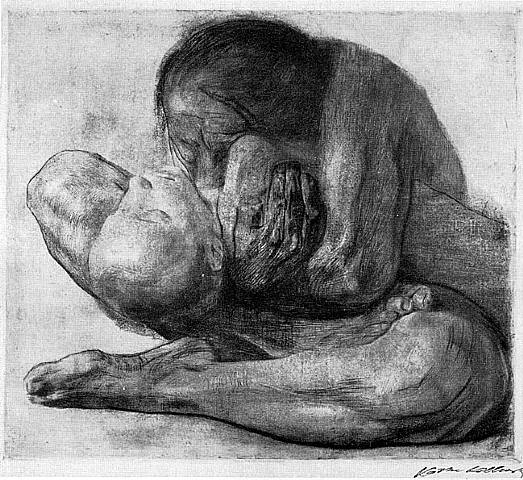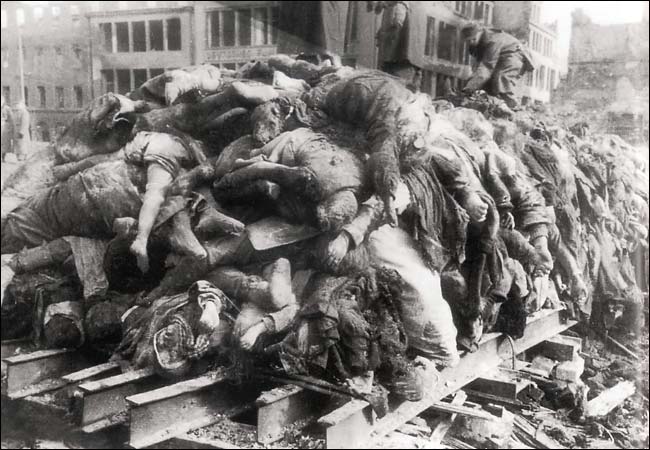My mother said that to me once just before I did a lecture about her experiences and my dad’s experiences as slave laborers in Nazi Germany. She wanted me to be sure I told the audience that my parents weren’t the only people that terrible things happened to in those concentration camps. I promised my mother I would, and in fact, when I got to the lecture hall that night and stood up in front of that audience the first thing I did was tell them what my mother told me to.
.
“We weren’t the only ones.”
For a long time, I thought I knew what she meant by that sentence. My mom hadn’t told me much about her experiences. My dad, however, had told me a lot about his terrible experiences during his five years in the Germany concentration camp system, and he also told me something about what had happened to my mother and her family, her mother, her sister, and her sister’s baby. They had been brutally murdered by the Nazis who came to their farm in eastern Poland. As I said, my mother didn’t talk about this experience or many of her other experiences for much of my life with her. I talk about this in one of my poems, “Here’s What My Mother Won’t Talk About.” In it, my mother’s response to my questions about her time under the Nazis is to tell me that I’m a fool and “If they give you bread, eat it. If they beat you, run.” That was pretty much it.
This last September, Tracy Meyers, the Director of the Women and Gender Studies Program at Valdosta State University, invited me to do a lecture and poetry reading about my mother’s experiences during and after the war.
To prepare for it, I started thinking about my mother’s experiences and her silence about so much that had happened to her. I re-read an article I read years before by Jessica Alpert called "Muted Testimony: Rape and Gendered Violence of the Holocaust." Alpert’s argument was that women tended not to talk about their experiences in the concentration camps and the death camps because of the sexual brutality they experienced. This led me to do some more research, and what I found out was that a lot of the histories and memoirs and literary writings about war talk about what men are doing in a war, but these histories don’t always look at what’s happening to women and how they are experiencing war.
It’s not surprising. Women’s experiences of war tend to be different than men’s experiences of war. Women’s experience tend to be brutal and without much glory or sense of victory or accomplishment. Doing a Google search of “women” and “war” brings up things like the Japanese rape of the city of Nanking. The actual number of rapes that occurred there is hard to pin down but they range from 20,000 to 80,000. One source said that when the Japanese soldiers weren’t raping the women, “They took great pleasure in forcing fathers to rape their daughters and sons to rape their mothers.” British historian Antony Beevor says in Berlin: The Downfall 1945 that the Russians raped millions of women as they moved west, pushing back the Germans in the final months of World War II. These women were not only German women but also Russian women and Polish women and Ukrainian women and the women in the liberated concentration and death camps.
.
In her study Victims, Heroes, Survivors: Sexual Violence on the Eastern Front in World War II (available on the internet), historian Wendy Jo Gertjejanssen argues that sexual violence against women by Russians and Germans both was common and seldom talked about.
Dr. Gertjejanssen says at the start of her study that sexual violence during the war happened to many, many women, perhaps millions, on the eastern front. These women were sexually abused and harassed, they were forced into military brothels, and they were raped and mutilated. Also, because they were deliberately starved, these women often found that they had to exchange sex for food and water to stay alive.

If you look at the memoirs left by women who had been in the camps, not many of these memoirs talk about the sexual brutality that took place in the camps. One of them that does is Seed of Sarah by Judith Isaacson. In fact, she talks about women’s silence about being sexually brutalized. In her book, Isaacson relates a conversation she had with her daughter about what happened to the women her mother knew during the war. Isaacson tells her that most of them had been raped and killed either by Nazis or the Russians. When her daughter wonders why no one ever hears about all of the women who were raped during the war, Isaacson answers, "The Anne Franks who survived rape don’t write their stories.”
Was my mother raped? Was she sexually brutalized?
These are hard questions for me to think about. They make me feel very sad. You want to think about the good things that happened to the ones you love; you don’t want to think of all the terrible things that might have happened. If my mother herself was not the victim of sexual brutalization, she must have seen it, and it must have hurt her deeply. One of the things my father frequently talked about and that I heard about from the time I was a kid was the story about the German soldier cutting a woman’s breasts with his bayonet. This woman was my aunt Genja who died with her baby and my grandmother when the Germans came to my mother’s farm.
Toward the end of her life, my mother told me about how she cried and couldn’t stop crying after this killing. I wrote a poem about it called “Grief.” It talks about how she was taken to Germany after the death of her sister Genja and the baby and her mother. Here it is:
Grief
My mother cried for a week, first in the boxcars
then in the camps. Her friends said, “Tekla,
don’t cry, the Germans will shoot you
and leave you in the field,” but she couldn’t stop.
Even when she had no more tears, she cried,
cried the way a dog will gulp for air
when it’s choking on a stick or some bone
it’s dug up in a garden and swallowed.
The woman in charge gave her a cold look
and knocked her down with her fist like a man,
and then told her if she didn’t stop crying
she would call the guard to stop her crying.
But my mother couldn’t stop. The howling
was something loose in her nothing could stop.
----------------------------------------------
I want to say one more things. The poet Christina Pacosz sent me an email a couple weeks ago reminding me that bad things haven’t stopped happening with the end of World War II. She’s absolutely right.
My mother cried for a week, first in the boxcars
then in the camps. Her friends said, “Tekla,
don’t cry, the Germans will shoot you
and leave you in the field,” but she couldn’t stop.
Even when she had no more tears, she cried,
cried the way a dog will gulp for air
when it’s choking on a stick or some bone
it’s dug up in a garden and swallowed.
The woman in charge gave her a cold look
and knocked her down with her fist like a man,
and then told her if she didn’t stop crying
she would call the guard to stop her crying.
But my mother couldn’t stop. The howling
was something loose in her nothing could stop.
----------------------------------------------
I want to say one more things. The poet Christina Pacosz sent me an email a couple weeks ago reminding me that bad things haven’t stopped happening with the end of World War II. She’s absolutely right.
This comes from a UNICEF post on Sexual Violence as a Weapon of War:
"The State of the World's Children 1996 report notes that the disintegration of families in times of war leaves women and girls especially vulnerable to violence. Nearly 80 per cent of the 53 million people uprooted by wars today are women and children. When fathers, husbands, brothers and sons are drawn away to fight, they leave women, the very young and the elderly to fend for themselves. In Bosnia and Herzegovina, Myanmar and Somalia, refugee families frequently cite rape or the fear of rape as a key factor in their decisions to seek refuge."(http://www.unicef.org/sowc96pk/sexviol.htm)
My mother wasn’t the only one.

(Drawing by Kathe Kollwitz)

 After the war, the Germans who survived the war got shovels and bulldozers and shoved all of those 400,000 building out of the city. Altogether there was about 17,000,000 cubic yards of rubble, bricks, bits of glass and silverware that melted together during the bombings, wood beams, busted up furniture, rusting pipes and porcelain bathtubs. It made a mountain 390 foot tall that in the past was used by Berliners looking to ski in the winter. It’s called Teufelsberg in German. That means Devil’s Mountain.
After the war, the Germans who survived the war got shovels and bulldozers and shoved all of those 400,000 building out of the city. Altogether there was about 17,000,000 cubic yards of rubble, bricks, bits of glass and silverware that melted together during the bombings, wood beams, busted up furniture, rusting pipes and porcelain bathtubs. It made a mountain 390 foot tall that in the past was used by Berliners looking to ski in the winter. It’s called Teufelsberg in German. That means Devil’s Mountain.